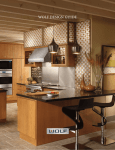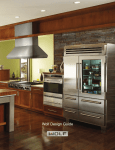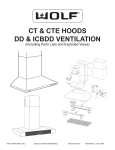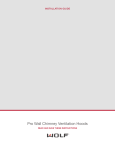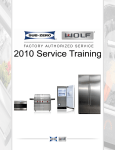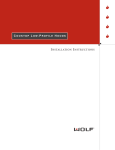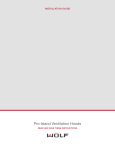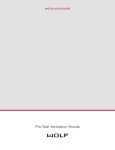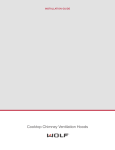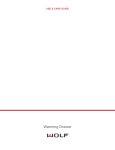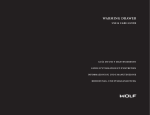Download Wolf CTEIH42I Installation guide
Transcript
INSTALLATION GUIDE Cooktop Low-Profile Ventilation Hoods Contents Important Note Wolf Cooktop Low-Profile Ventilation Hoods . . . . . . . . 3 To ensure the safe and efficient use of Wolf equipment, please take note of the following types of highlighted information throughout this guide: Cooktop Low-Profile Hood Specifications . . . . . . . . . . 4 Cooktop Low-Profile Hood Installation . . . . . . . . . . . . 8 Service Information . . . . . . . . . . . . . . . . . . . . . . . . . . . 18 Features and specifications are subject to change at any time without notice. Visit wolfappliance.com/specs for the most up-to-date information. IMPORTANT NOTE: Throughout this guide, dimensions in parentheses are millimeters unless otherwise specified. IMPORTANT NOTE highlights information that is especially important. CAUTION signals a situation where minor injury or product damage may occur if instructions are not followed. WARNING states a hazard that may cause serious injury or death if precautions are not followed. Wolf Cooktop Low-Profile Ventilation Hoods 3 wolfappliance.com/specs Cooktop Low-Profile Hood Installation IMPORTANT NOTE: This installation must be completed by a qualified installer or Wolf authorized service center technician. Read this entire installation guide prior to installation and save for the local inspector’s reference. The homeowner should keep this installation guide for future reference. IMPORTANT NOTE: Wolf cooktop low-profile hoods are recommended for use with Wolf induction, electric and gas cooktops and integrated modules. For ranges and rangetops, a Wolf pro ventilation hood is recommended. Wolf Cooktop Low-Profile Hood This appliance must be installed in accordance with National Electrical Codes, as well as all state, municipal and local codes. The correct voltage, frequency and amperage must be supplied to the appliance from a dedicated, grounded circuit which is protected by a properly sized circuit breaker or time delay fuse. The proper voltage, frequency, and amperage ratings are listed on the product rating plate. Record the model and serial numbers before installing the ventilation hood. Both numbers are listed on the product rating plate, located on the underside of the hood, above the grease filter. The filter must be removed to access the rating plate. Refer to the illustration below. RATING PLATE Location of rating plate. Model Number Serial Number Cooktop Low-Profile Hood Specifications 4 Overall Dimensions LOW-PROFILE WALL HOODS 9 7/8" 10 7/8" 10 7/8" (251) (276) (276) 5 7/8" (149) 7 7/8" (200) TO 18 3/8" (467) 25 1/2" (648) 29 1/8" (740) TO 31" (788) TO TO 20 1/8" (511) 411/2" (1054) 20 1/8" (511) 48 3/4" (1238) 3 1/8" (79) 30" (762), 36" (914) AND 45" (1143) WIDTHS 3 1/8" (79) 17 3/4" 17 3/4" (451) (451) RECIRCULATING APPLICATION LOW-PROFILE ISLAND HOOD 11 3/4" 9 7/8" (298) (251) 9 7/8" (251) 2 3/8" (60) 4 3/4" (121) TO 14" (356) 14" (356) 28 3/8" (721) TO 30 3/4" (781) TO 40" (1016) TO 22 7/8" (581) 22 7/8" (581) 40" (1016) 3 1/8" (79) 42" (1067) 21 5/8" (549) 3 1/8" (79) 21 5/8" (549) RECIRCULATING APPLICATION Cooktop Low-Profile Hood Specifications 5 wolfappliance.com/specs Installation Considerations Electrical Requirements Wolf cooktop low-profile hoods are recommended for use with Wolf induction, electric and gas cooktops and integrated modules. These hoods have a telescopic flue that allows you to reach a ceiling height of 8' (2.4 m) to 9' (2.7 m) with a finished look. Wolf cooktop low-profile ventilation hoods require a separate, grounded 120 V AC, 60 Hz power supply. The service should have its own 15 amp circuit breaker. IMPORTANT NOTE: Wolf recommends that the bottom of the ventilation hood be installed 24" (610) to 30" (762) above the countertop. Low-profile wall and island hoods are available with an internal blower. Wall hood models CTEWH36 and CTEWH45 will require an in-line or remote blower assembly, available through your authorized Wolf dealer. For local dealer information, visit the find a showroom section of our website, wolfappliance.com. The blower will vary in size and is dictated by the cooking unit, the volume of air that needs to be moved and the length of the duct run. Refer to ventilation recommendations in the Wolf design guide. These hoods have an 6" (152) round duct with vertical discharge. IMPORTANT NOTE: Use only a Wolf blower with the cooktop low-profile hood. BACKSPLASH Optional stainless steel backsplashes are available in widths to match all cooktop low-profile hoods through your authorized Wolf dealer. For local dealer information, visit the find a showroom section of our website, wolfappliance.com. Locate the electrical supply within the shaded area shown in the illustration for your specific model on the following pages. IMPORTANT NOTE: You must follow all National Electrical Code regulations. In addition, be aware of local codes and ordinances when installing your service. Cooktop Low-Profile Hood Specifications 6 Installation Specifications LOW-PROFILE WALL HOODS 291/8" (740) TO 411/2" (1054) HEIGHT OF HOOD E LOCATION OF ELECTRICAL 5" (127) 15" (381) 17 3/4" (451) DEPTH OF HOOD 30" (762), 36" (914) OR 45" (1143) 8' (2.4 m) TO 9' (2.7 m) FLOOR TO CEILING HEIGHT WIDTH OF HOOD 24" (610) TO 30" (762) TO COUNTERTOP Cooktop Low-Profile Hood Specifications 7 wolfappliance.com/specs Installation Specifications LOW-PROFILE ISLAND HOODS LOCATION OF ELECTRICAL THROUGH TOP OF HOOD 28 1/4" (718) TO 411/2" (1054) HEIGHT OF HOOD 21 5/8" (549) DEPTH OF HOOD 42" (1067) WIDTH OF HOOD 8' (2.4 m) TO 9' (2.7 m) FLOOR TO CEILING HEIGHT 24" (610) TO 30" (762) TO COUNTERTOP Cooktop Low-Profile Hood Installation Ducting Options Wolf cooktop low-profile hoods may be used in a ducted or recirculating installation. For greatest efficiency, the ducted installation is recommended. DUCTED INSTALLATION In a ducted installation, the hood aspirates the kitchen air saturated with fumes and odors, passes it through the grease filter and expels it to the outside through ductwork. For this installation, a ventilation hood with an internal, in-line or remote blower can be used. The in-line blower is located in ductwork between the hood and the outside. The remote blower can be mounted on the roof or, for wall hoods, an exterior wall. Wolf in-line and remote blowers are available through your authorized Wolf dealer. RECIRCULATING INSTALLATION IMPORTANT NOTE: Only low-profile hoods with an internal blower can be used in a recirculating installation. In a recirculating installation, the hood aspirates the kitchen air saturated with fumes and odors, purifies it through the grease filter and charcoal filter and returns clean air into the room. A recirculation kit available through your authorized Wolf dealer is required. For local dealer information, visit the find a showroom section of our website, wolfappliance.com. 8 Install Ductwork To reduce the risk of fire, use only metal ductwork. IMPORTANT NOTE: Unless used in a recirculating installation, ventilation hoods must exhaust to the outdoors. A 6" (152) round duct is recommended for cooktop lowprofile hoods. Use only rigid metal ductwork, do not use flex ducting. Consult a qualified HVAC engineer for specific ducting applications. Decide where the ductwork will run between the wall hood and the outside. A straight, short duct run will allow the hood to perform most efficiently. Limit the number of elbows and transitions. The duct run should be no longer than 50' (15 m). There is a possibility of noise issues, if a remote blower is used with a short duct run. Wolf recommends installing a backdraft damper in all installations. A backdraft damper is included with the hood. It is built into the transition from the hood to the duct run. Unless you are using a remote blower, a roof or wall cap must be installed. Connect ductwork to the cap and work back towards the hood. Use duct sealing tape to seal joints between ductwork sections. Local building codes may require the use of make-up air. Consult your local HVAC professional for specific requirements in your area. Cooktop Low-Profile Hood Installation 9 wolfappliance.com/specs Install Ductwork LOW-PROFILE WALL HOODS LOW-PROFILE ISLAND HOOD DUCTWORK INSTALLATION THROUGH ROOF DUCTWORK INSTALLATION THROUGH ROOF 10 7/8" (276) 8' (2.4 m) TO 9' (2.7 m) CEILING HEIGHT 29 1/8" (740) TO 411/2" (1054) TELESCOPING HOOD HEIGHT DUCTWORK INSTALLATION THROUGH WALL 1 20 /8" (511) 28 3/8" (721) TO 40" (1016) TELESCOPING HOOD HEIGHT DUCTWORK INSTALLATION THROUGH EAVE— INTERNAL BLOWER 9 7/8" (251) 3 1/8" (79) 17 3/4" (451) HOOD DEPTH 21 5/8" (549) HOOD DEPTH 24" (610) TO 30" (762) 24" (610) TO 30" (762) BOTTOM OF HOOD TO COUNTERTOP BOTTOM OF HOOD TO COUNTERTOP 8' (2.4 m) 9' (2.7 m) CEILING HEIGHT Cooktop Low-Profile Hood Installation 10 Wall Hoods—Ducted Installation Locate the electrical supply through the wall within the shaded area shown in the illustration on page 6. Install ductwork as outlined on pages 8–9. Mount the bottom panel to the hood. Attach with the four screws provided on the hinge side of the panel. IMPORTANT NOTE: If a backsplash is to be used, it should be installed prior to mounting the wall hood. Secure the hood mounting brackets to the wall studs prior to installing the backsplash. Refer to installation instructions provided with the backsplash. Hang the hood on the bracket as shown in illus 2. Adjust the horizontal position moving the hood to the right or left so that it is properly aligned. When adjustment has been completed, without removing the hood, mark the four additional holes to be drilled in the wall. Remove the hood and drill four 5/16" diameter holes and fit the screw anchors provided. Mount the hood to the wall using the screws provided. Mount the plate of the electrical system fixing it with three screws as shown in illus 3 below. ATTACH TELESCOPIC FLUE MOUNT HOOD TO WALL IMPORTANT NOTE: Wolf recommends that the bottom of the ventilation hood be installed 24" (610) to 30" (762) above the countertop. Draw a vertical line on the wall indicating the centerline of the hood. Mark the first two holes to be drilled in the wall. Position according to dimensions shown in illus 1 below. Drill two 5/16" diameter holes and fit the screw anchors provided. Attach the metal bracket to the wall using the screws provided. Use the two cut-out triangles on the bracket to position it exactly along the vertical axis of the hood. Assemble the three support brackets for the telescopic flue as shown in illus 4. The width of the bracket assembly can be adjusted. With screws and anchors provided, attach the bracket assembly to the ceiling so that it is positioned along the axis with the hood. ANCHORS SCREWS BRACKET 5 1/16" (129) Illus 3. 13 3/8" (340) CENTER OF HOOD Illus 1. Illus 2. Illus 4. Cooktop Low-Profile Hood Installation 11 wolfappliance.com/specs Wall Hoods—Ducted Installation Fit 6" (152) flexible metal ducting (not provided) to the air vent of the hood and seal with duct tape. Refer to illus 5 below. For exhaust hoods, turn the upper flue over so that the air exhaust grid is in the lower section. IN-LINE OR REMOTE BLOWER WIRING Blower connection at the hood: 1) Run Romex® wire from the in-line or remote blower to the hood’s electrical box marked “motor connection”. 2) Remove the cover from the electrical box and remove one knockout as shown in illus 7 below. WIRING CONNECTIONS Electrical connection at the hood: 1) Run Romex® wire from the service panel to the hood’s electrical box marked “120 V AC input”. 2) Remove the cover from the electrical box and remove one knockout as shown in illus 6. 3) Secure the Romex® wire to the electrical box through a conduit connector. Use wire connectors or wire nuts approved by UL or C/UL. 4) Make electrical connections at the hood. Connect white to white, black to black and green to ground. 5) Place all wiring connections inside the electrical box and reinstall the cover. Make sure all wires are secure and that no wires are pinched between the cover and electrical box. 3) Secure the Romex® wire to the electrical box through a conduit connector. Use wire connectors or wire nuts approved by UL or C/UL. 4) Make electrical connections at the hood. Connect white to red, black to black and green to ground. 5) Place all wiring connections inside the electrical box and reinstall the cover. Make sure all wires are secure and that no wires are pinched between the cover and electrical box. IMPORTANT NOTE: Refer to installation instructions provided with the in-line or remote blower assembly for additional mounting and wiring instructions. ATTACH FLUE EXTENSION Insert the flue extensions, setting them on the hood. Extend the upper flue to the ceiling and secure with two screws as shown in illus 8. WIRING BOX FLEXIBLE DUCTING Illus 5. SCREWS WIRING BOX Illus 6. Illus 7. Illus 8. Cooktop Low-Profile Hood Installation 12 Wall Hoods—Recirculating Installation INTERNAL BLOWER MODELS WIRING CONNECTIONS IMPORTANT NOTE: A recirculation kit is required for this installation. The kit is available through your authorized Wolf dealer. For local dealer information, visit the find a showroom section of our website, wolfappliance.com. Follow the same instructions for wiring connections as outlined for ducted installations on page 11. Locate the electrical supply through the wall within the shaded area shown in the illustration on page 6. Install ductwork as outlined on pages 8–9. MOUNT HOOD TO WALL Follow the same instructions for mounting the hood to the wall as outlined for ducted installations on page 10. INSTALL CHARCOAL FILTER First remove the grease filter(s). To access the filter(s), gently press up on the front edge of the bottom panel and allow it to rotate downward. Push the handle outward and pull the grease filter(s) downward to remove. Then install the charcoal filter by inserting the two filter clips in the slots and turning the filter towards the inside of the hood. Reinstall the grease filter(s) using the reverse procedure. Refer to illus 11 below. ATTACH TELESCOPIC FLUE Assemble the three support brackets for the telescopic flue as shown in illus 4 on page 10. The width of the bracket assembly can be adjusted. With screws and anchors provided, attach the bracket assembly to the ceiling so that it is positioned along the axis with the hood. Mount the flange on the hood to correspond with the air outlet point shown in illus 9 below. Fit 5" (127) flexible metal ducting (not provided) to the air baffle of the hood and seal with duct tape. Attach the air baffle to the upper flue with four screws as shown in illus 10. Connect the other end of the flexible ducting to the flange. SCREWS FLEXIBLE DUCTING Illus 9. Illus 10. CHARCOAL FILTER GREASE FILTER Illus 11. Cooktop Low-Profile Hood Installation 13 wolfappliance.com/specs Island Hoods—Ducted Installation Locate the electrical supply through the wall within the shaded area shown in the illustration on page 7. Install ductwork as outlined on pages 8–9. Mount the bottom panel to the hood. Attach with the four screws provided on the hinge side of the panel. Refer to illus 12 below. MOUNT HOOD TO CEILING Using the drilling template, drill holes for attaching the mounting bracket to the ceiling on the vertical side of your hood. The center line of the mounting bracket is in line with the center of the control panel. IMPORTANT NOTE: Placement of the mounting bracket is critical for proper alignment of the hood with the cooktop. Attach the mounting bracket to the ceiling using the screws and anchors provided. Refer to illus 13 below. The position of the bracket determines the final position of the hood. The side with the slot corresponds to the side opposite the controls. Assemble the plate of the electrical system fixing it with two screws and washers as shown in illus 14. HINGE BOTTOM PANEL 5 15/16" Illus 12. ELECTRICAL PLATE (151) 5 15/16" (151) SLOT Illus 13. Illus. 14 Cooktop Low-Profile Hood Installation 14 Island Hoods—Ducted Installation ATTACH TELESCOPIC FLUE WIRING CONNECTIONS Attach the telescopic flue to the mounting bracket with four screws provided. Run the air evacuation pipe through the telescopic flue and run the Romex® wire through the hole in the bracket. Adjust the height of the telescopic flue with the four retaining screws. Refer to illus 15 below. Take into account that the height of the hood is 3 1/8" (79) and that the bottom of the hood should be installed 24" (610) to 30" (762) above the countertop. Electrical connection at the hood: Slide the upper flue onto the telescopic flue with the slots of the upper flue facing upwards. Attach the flue to the bracket with two screws as shown in illus 16. Slide the lower flue over the upper flue, to the top and temporarily secure it in this position using adhesive tape. Raise the hood to the telescopic flue and connect the air outlet duct to the hood. Attach the hood to the telescopic flue with the four screws provided. Refer to illus 17. 1) Run Romex® wire from the service panel to the hood’s electrical box marked “120 V AC input”. 2) Remove the cover from the electrical box and remove one knockout as shown in illus 18 below. 3) Secure the Romex® wire to the electrical box through a conduit connector. Use wire connectors or wire nuts approved by UL or C/UL. 4) Make electrical connections at the hood. Connect white to white, black to black and green to ground. 5) Place all wiring connections inside the electrical box and reinstall the cover. Make sure all wires are secure and that no wires are pinched between the cover and electrical box. COMPLETE THE INSTALLATION Remove the adhesive tape and slide the lower flue downward, placing it gently onto the hood base. Installation is now complete. Install the grease filters. ELECTRICAL CABLE UPPER FLUE WIRING BOX RETAINING SCREW Illus 15. SCREWS Illus 16. Illus 17. Illus 18. Cooktop Low-Profile Hood Installation 15 wolfappliance.com/specs Island Hoods—Recirculating Installation IMPORTANT NOTE: A recirculation kit is required for this installation. The kit is available through your authorized Wolf dealer. For local dealer information, visit the find a showroom section of our website, wolfappliance.com. Attach the reduction to the air venting opening of the hood by pressing slightly. Refer to illus 21 below. Raise the hood to the telescopic flue and connect the air outlet duct to the hood. Attach the hood to the telescopic flue with the four screws provided as shown in illus 22. Locate the electrical supply through the ceiling and inside the area of the flue, above the mounting bracket and right of center. WIRING CONNECTIONS MOUNT HOOD TO CEILING Follow the same instructions for wiring connections as outlined for ducted installations on the previous page. Follow the same instructions for mounting the hood to the ceiling as outlined for ducted installations on page 13. COMPLETE THE INSTALLATION ATTACH TELESCOPIC FLUE Insert the air baffle into the structure as shown in illus 19. Remove the adhesive tape and slide the lower flue downward, placing it gently onto the hood base. Installation is now complete. Through the opening, fit the flange to the baffle. Turn the flange to secure it in place. Fit 5" (127) flexible metal ducting (not provided) to the flange and seal with duct tape. Refer to illus 20 below. REDUCTION Slide the upper flue onto the telescopic flue with the slots of the upper flue facing upwards. Attach the flue to the bracket with two screws as shown in illus 16 on the previous page. Slide the lower flue over the upper flue, to the top and temporarily secure it in this position using adhesive tape. SCREWS Illus 21. FLANGE AIR BAFFLE Illus 19. FLEXIBLE DUCTING Illus 20. Illus 22. Cooktop Low-Profile Hood Installation 16 Island Hoods—Recirculating Installation INSTALL CHARCOAL FILTER First remove the grease filters. To access the filters, gently press up on the front edge of the bottom panel and allow it to rotate downward. Push the handle outward and pull the grease filters downward to remove. Then install the charcoal filter by inserting the two filter clips in the slots and turning the filter towards the inside of the hood. Reinstall the grease filters using the reverse procedure. Refer to illus 23. CHARCOAL FILTER GREASE FILTER Illus 23. Cooktop Low-Profile Hood Installation 17 wolfappliance.com/specs In-Line and Remote Blowers Allow enough space for transitions needed between the blower and connecting ductwork. For best performance, locate transitions nearest the blower. BLOWER INSTALLATION IMPORTANT NOTE: Refer to specific installation instructions provided with each blower assembly for additional mounting and wiring instructions. Refer to the illustrations below for overall dimensions of Wolf in-line and remote blowers. Installation instructions shipped with each Wolf ventilation product provide detailed specifications. These instructions can also be found on our website, wolfappliance.com/specs. Locate the blower so that the length of the duct run and number of elbows and transitions are kept to a minimum. The duct run should be no longer than 50' (15 m). Remote blowers should be located between wall studs or roof rafters. Avoid pipes, wires and other ductwork. IN-LINE AND REMOTE BLOWER DIMENSIONS 24 7/8" (632) 24 3/8" (619) 18" 11 3/4" (457) (298) 12" (305) 18 1/2" (470) 4 1/2" (114) 8" (203) 211/2" 22" 12 1/4" (546) 18" (559) (457) (311) 600 CFM in-line blower. 1100 CFM in-line blower. 18" (457) 20 3/4" 28 1/4" (718) 10" (254) 29 1/2" (527) (749) 10" (254) DIAMETER DIAMETER 14 3/4" 15 1/2" 24 1/2" 29 1/2" (375) (254) 29 1/2" (749) 10" (254) (394) 21" (533) 10" (749) 10" (254) DIAMETER 14 3/4" 29 1/2" (375) (749) (622) 10 1/8" 14" 10 3/8" (257) (356) 4 3/4" 24 3/4" (121) (629) 600 CFM and 900 CFM remote blower. (264) 22" (559) 1200 CFM remote blower. 7 1/4" 25" 7 1/4" (184) (635) (184) 1500 CFM remote blower. Service Information 18 Troubleshooting Service Information IMPORTANT NOTE: If the ventilation hood does not operate properly, follow these troubleshooting steps: If service is necessary, maintain the quality built into your ventilation hood by calling a Wolf authorized service center. • Verify that electrical power is being supplied to the ventilation hood. • Check electrical connections to ensure that the installation has been completed correctly. • Refer to the troubleshooting guide in the Wolf cooktop low-profile ventilation hoods use & care guide. • If the ventilation hood still does not operate properly, contact a Wolf authorized service center. Do not attempt to repair the ventilation hood yourself. Wolf is not responsible for service required to correct a faulty installation. To obtain the name and number of a Wolf authorized service center, check the contact & support section of our website, wolfappliance.com or call Wolf customer service at 800-332-9513. When calling for service, you will need the model and serial numbers of the ventilation hood. This information is found on the product rating plate, located on the underside of the hood, above the grease filter. The filter must be removed to access the rating plate. Refer to the illustration below. RATING PLATE Location of rating plate. The information and images in this guide are the copyright property of Wolf Appliance, Inc. Neither this guide nor any information or images contained herein may be copied or used in whole or in part without the express written permission of Wolf Appliance, Inc. ©Wolf Appliance, Inc. all rights reserved. Wolf, Wolf & Design, Wolf Gourmet, W & Design and the color red as applied to knobs are registered trademarks and service marks of Wolf Appliance, Inc. Sub-Zero, Sub-Zero & Design, Dual Refrigeration, Constant Care and The Living Kitchen are registered trademarks and service marks of Sub-Zero, Inc. (collectively, the “Company Marks.”) All other trademarks or registered trademarks are property of their respective owners in the United States and other countries. WOLF APPLIANCE, INC. P. O. BOX 44848 MADISON, WI 53744 816999 REV-A 8/ 2010 WOLFAPPLIANCE.COM 800.332.9513




















